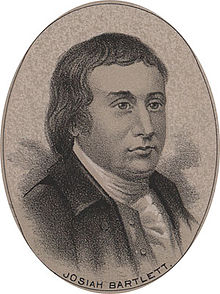
Back جوزايا بارتليت Arabic جوزايا بارتليت ARZ جوزیاه بارتلت AZB Josiah Bartlett Catalan Josiah Bartlett Czech Josiah Bartlett German Josiah Bartlett Spanish جوسیا بارتلت Persian Josiah Bartlett Finnish Josiah Bartlett French
Josiah Bartlett | |
|---|---|
 | |
| 1st Governor of New Hampshire | |
| In office June 5, 1790 – June 5, 1794 | |
| Preceded by | President of New Hampshire |
| Succeeded by | John Taylor Gilman |
| Chief Justice of the New Hampshire Superior Court of Judicature | |
| In office 1788–1790 | |
| Delegate to the Continental Congress from New Hampshire | |
| In office 1778–1778 | |
| In office 1775–1776 | |
| Personal details | |
| Born | November 21, 1729 Amesbury, Province of Massachusetts Bay, British America |
| Died | May 19, 1795 (aged 65) Kingston, New Hampshire, U.S. |
| Political party | Democratic-Republican |
| Spouse | Mary Bartlett |
| Children | 10, including Josiah Bartlett Jr. |
| Relatives | Luella J. B. Case (granddaughter) |
| Signature | |
Josiah Bartlett (December 2, 1729 [O.S. November 21, 1729][a] – May 19, 1795) was an American Founding Father,[1] physician, statesman, a delegate to the Continental Congress for New Hampshire, and a signatory to the Declaration of Independence and Articles of Confederation. He was a member of the convention which framed the Constitution of the United States in 1787. He served as the first governor of New Hampshire and chief justice of the New Hampshire Superior Court of Judicature, now the New Hampshire Supreme Court.[2][3]
Bartlett practiced medicine over 40 years. During that time, he promoted wellness practices, including diet, exercise, fresh air, and a contented mind. He fostered using messages from one's body to improve one's health, like drinking when thirsty and covering up when sick with chills. He managed an outbreak of throat distemper, or diphtheria, with Peruvian bark, also known as quinine, with much greater success than traditional treatments. When his was very sick himself, he took cold cider, versus a warm drink, at intervals to break a fever.
As governor, Bartlett worked to ensure the state's success by supporting farming and businesses, improving the state's infrastructure, codifying and enacting laws, adding special judges, and paying off the state's debt. He ran a farm and orchards over his life. His wife Mary Bartlett took on that responsibility when Bartlett was away at the Continental Congress in Pennsylvania. Bartlett and his wife wrote letters to one another that provide insight into the life of a founding father, the trials they experienced and conquered as they fought for a country independent from British rule, and their strength in creating a stable life for themselves and their twelve children, eight of whom survived.
Cite error: There are <ref group=lower-alpha> tags or {{efn}} templates on this page, but the references will not show without a {{reflist|group=lower-alpha}} template or {{notelist}} template (see the help page).
- ^ Bernstein, Richard B. (2011) [2009]. "Appendix: The Founding Fathers: A Partial List". The Founding Fathers Reconsidered. New York: Oxford University Press. ISBN 978-0199832576.
- ^ Kelly, Howard A.; Burrage, Walter L. (eds.). . . Baltimore: The Norman, Remington Company.
- ^ Cite error: The named reference
CongBiowas invoked but never defined (see the help page).